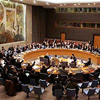
Last week, the U.N. Security Council discussed the details of the extended mandate for the year-old UN Mission in the Central African Republic and Chad, also known as MINURCAT.
In September, Secretary-General Ban Ki-Moon suggested doubling the number of MINURCAT troops to address increased banditry threats, but many troop- contributing countries were wary of expanding a mission that has to date failed to fulfill its mandate to deal with the humanitarian threat posed by armed groups on Chad’s borders with Sudan’s troubled Darfur region and the northeastern part of the Central African Republic. At the MINURCAT discussion last week, the Security Council settled on the deployment of a “highly mobile peacekeeping force of at least 4,900 ” troops to eastern Chad, a number that was agreed to by the Chad government.
As part of its mandate, MINURCAT has tried to combat banditry by training Chadian police officers to patrol displaced and refugee camps in the East, but a year in, less than half of a planned 850 Chadian officers have been trained and only a handful of officers have been deployed to IDP and refugee camps in the East. The shortcomings of the policing front have not gone unnoticed by humanitarians who are trying desperately to continue their critical assistance in a difficult security environment.
Meanwhile, a UN peacekeeping mission is not and will never be a stand-alone solution to Chad’s endemic security and banditry problems. Chad needs a comprehensive strategy aimed at addressing the root causes of its internal political rot if it is ever to emerge from its perpetual crises.
Despite the increased size of MINURCAT, it is unlikely that the force will be succeed in stabilizing Chad’s troubled border region absent a well-defined plan for a broader political solution in Chad that is backed by the international community.

